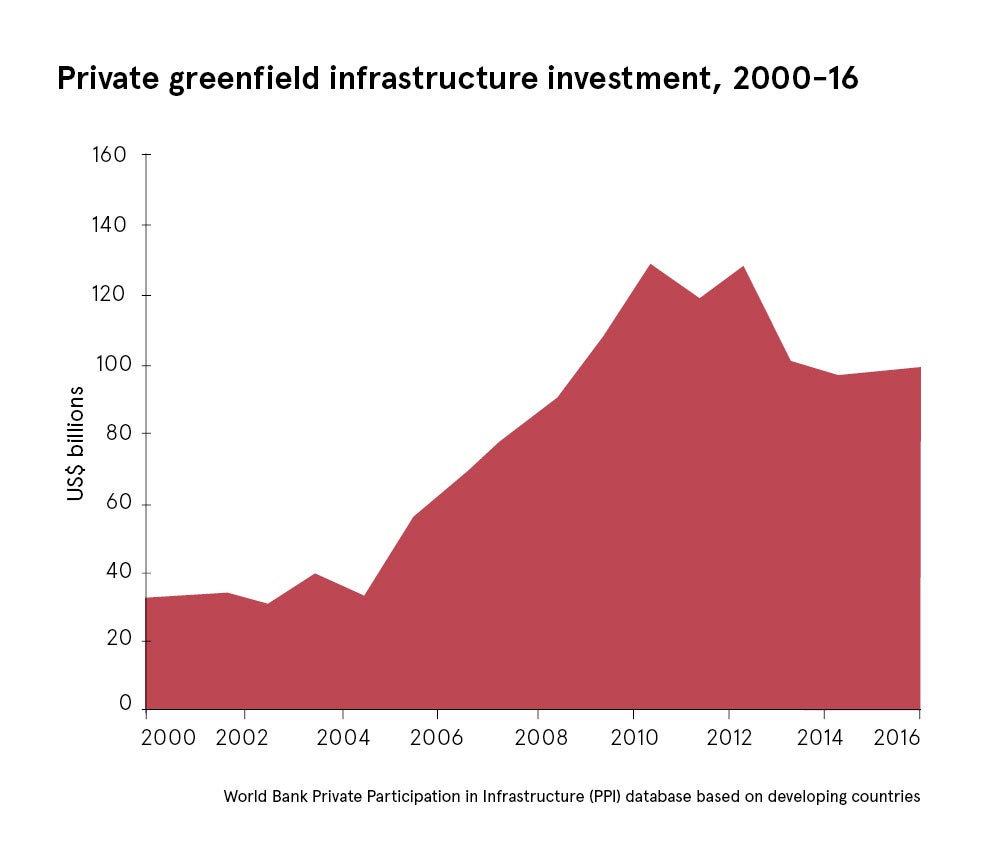 Investing in the infrastructure of emerging or growth markets presents a compelling opportunity. There is a significant supply-demand imbalance, and meeting the massive need for capital investment can be transformational for countries, cities and communities, while generating impressive risk-adjusted returns for institutional investors.
Investing in the infrastructure of emerging or growth markets presents a compelling opportunity. There is a significant supply-demand imbalance, and meeting the massive need for capital investment can be transformational for countries, cities and communities, while generating impressive risk-adjusted returns for institutional investors.
Economic and urban population growth in these markets is outpacing that of the developed world. Populations are rapidly urbanising; three quarters of the world’s urbanites live in growth markets compared with only 40 per cent in 1950, while gross domestic product (GDP) is projected to be 3 per cent higher than the developed world for the foreseeable future. When you combine these macro elements, it is clear the need for infrastructure is huge.
A recent McKinsey report estimated that $3.7 trillion of investment in economic infrastructure alone is needed every year from now until 2035 to keep pace with projected GDP growth globally. Almost two thirds of global infrastructure investment in this period is required in the growth markets.
Since inception in 2004, Actis has attracted $13 billion into growth markets and established itself as a leading investor across Africa, Asia and Latin America, in energy, private equity and real estate.
When I joined Actis to build the infrastructure business, the firm was in the final stages of raising its fourth energy fund with close to $3 billion of capital commitments, reflecting the appetite that institutional investors have for the growth market opportunity and the confidence they have in Actis to realise it.

Historically, institutional investors have perceived growth markets as high risk. Therefore, they have demanded a high return, and as a result have focused more on the development and construction stages of infrastructure assets. This means that today there are derisked operating assets in the hands of owners who have little appetite for longer-term operational improvement strategy. In our view this provides a new, exciting and growing investment opportunity.
I was involved throughout the 1990s when the initial private sector infrastructure investment in emerging markets occurred and back then it was like the Wild West. Private investors were naive; they thought that they could solve big problems by simply throwing money at them and make outsized investment returns.
There is now significantly less risk in certain emerging market countries than there was 20 years ago. Governments in growth markets know they’re competing against other emerging economies for private capital. They know their internal budgets cannot fund all their needs. If they don’t adjust their regulatory and legal structures (in our experience many have), and make it compelling to bring in private infrastructure investment, then they’re going to fall behind and not keep up with that growth.
Private capital finds its way to those countries that take the necessary steps to provide an attractive investment environment for long-term investment in infrastructure. In emerging markets, some countries have been successfully attracting long-term private infrastructure investment for the past ten to fifteen years.
We focus on basic infrastructure that will drive future economic growth. Our firm understands the power sector extremely well; we know power generation, distribution and transmission, and infrastructure that services the sector. By driving operational improvement in these assets, with support from the community and the local government, great value can be created in this space for both investors as well as the local communities which the infrastructure serves.
For example, Actis’ energy business invested in Ostro, a 1,000-megawatt renewable power generation company with operations in Rajasthan, India’s second-largest state and one of the driest where there is severe need for safe drinking water. In addition to providing vital access to power for numerous businesses and households, the management team has also installed water facilities for the local communities where the generation facilities are located.
As a firm we have repeatedly seen that investing responsibly creates businesses that are better able to manage risks and opportunities; they are more resilient, more innovative, more able to deliver societal benefits – and ultimately more valuable for investors as a result.
To learn more about investing in growth markets please visit www.act.is/







